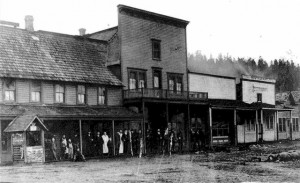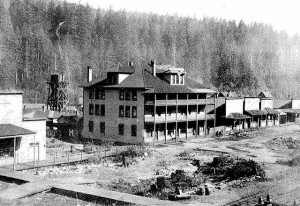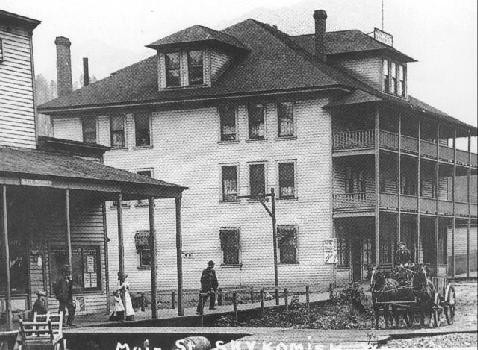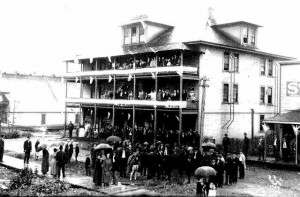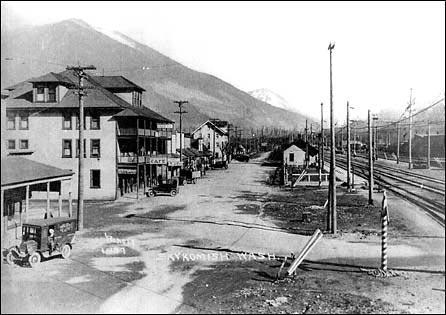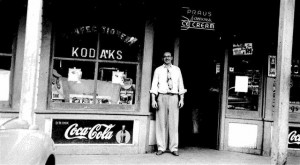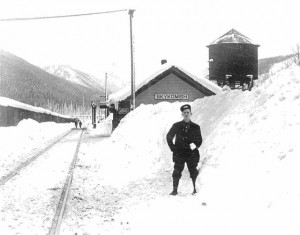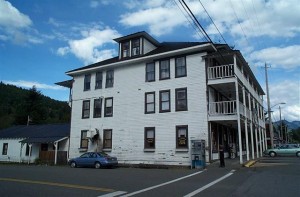|
The Skykomish Hotel is the cornerstone of the commercial historic district. The structure is important as part of the town’s early development as a commercial centre and railroad hub. It is also significant as an example of commercial vernacular architecture as it was often expressed in turn-of-the century Hotels. The first hotel on the site was a log structure with “Everything First Class.” According to one report it burned in 1902 and was replaced by Schneider’s Hotel, operated by H. Glass Sensiba. This was the structure destroyed in the catastrophic 1904 fire. D.J. Manning built the present Skykomish Hotel in 1904 at a cost $10,000, a “fine four story hotel…plastered throughout and neatly and comfortably fitted and finished” …an early promotional article in Coast Magazine shortly after the Hotel was built called it “excellent accommodations for those visiting the place to enjoy the magnificent fishing and hunting.” The article noted that nearby there was a large billiard hall and newsstand and three saloon buildings and a restaurant. It even had its own electrical plant, receiving permission in 1914 to use town water from Maloney Creek to provide power for the Hotel. Manning operated the Hotel until 1935, when his daughter and son-in-law Curtis and Anna Mannington Brotherton took over. The Hotel has had many owners since that time. Earl Riddle purchased it in 1944 and Bill Roberts (known as Sweet Pea) in 1965. Under his ownership, during the 1960s-70s, the Hotel’s bar was called Molly Gibson’s. It featured live music and dancing and was a very popular stop for skiers going to Stevens Pass. Following Roberts’ sudden death in 1979, Bill and Chris Dieffenbach owned it for ten years. It was during this period that some renovation was done; including the verandas, expanding the dining room and kitchen, and removing the 1940 installed asbestos shingle siding and removing lead-based paint from the wood siding underneath. Don and Gerriann Flynn purchased the Hotel in 1989 and sold it to Adam Dopps and Jane Lenzi, in March 1997. The Flynns’ carried a note and received the Hotel back. The Flynn’s entity went bankrupt following a drug bust at the Hotel which influenced the Ski Area’s decision not to continue its lease for employee housing or exercise its option to purchase. Skykomish Hotel LLC, controlled by Karl Benz, purchased the Hotel out of bankruptcy for $325,000 in September 2000. Benz plan to immediately begin a complete, historically correct renovation at a cost of $1.2 million, was scuttled by the Town’s Design Review Board and King County’s NGO, 4Culture.org. The Hotel sits on three lots (one facing Railroad Avenue and two facing 5th Street), with a fenced backyard. A one-story babbled wing, probably dating from the 1930s, extended to the north, containing a bar and a banquet room. This area was demolished in 2009 so the Hotel could be moved for BNSF Railway’s environmental cleanup scam. The prior configuration once contained a boiler room and later a rooming house (that may have been attached to the main building) and the Manning family house. The Hotel substantially retains its original appearance. It is three and a half stories high, with a hipped roof and dormers on each side. The second and third stories have distinctive full-width verandas with square balusters supported by square wood posts at street level. The rear elevation also has verandas, formerly with stairs descending from both floors to the back yard. The front verandas shade the first floor, which had entrances to the restaurant, the Hotel lobby and a storefront. Stairs went from the east end of the second floor balcony to the side yard. |
The entry doors and large-paned commercial windows with transoms appear to be original. Single hung windows, mostly arranged in groups of three, are found on upper floors.
The front portion of the first floor has three main spaces, each with a separate entry. The largest, encompassed the entire west side of the building with a restaurant, bar and banquet room in the rear addition. The restaurant and bar were remodeled and reconfigured several times over the years. The center doorway leads to a small Hotel lobby. To the right is a store space, which was for many years Glick Henry’s drug store. Known as The Palm, it featured sodas, confections, ice cream and tobacco. The storefront has since had other retail uses including, recently, a ski store, quilt shop and real estate/property management office. The floor contained a hatch door leading to a large underground crawl space rumoured to have been used for liquor storage during Prohibition. The interior of the Hotel has undergone several changes, but retains much of its integrity. An open stairway with stained fir wainscoting leads from the lobby to the second and third floors. Woodwork is stained fir throughout. The hotel rooms are on the second and third floors, 13 on the second floor and 14 on the third floor, with two large communal bath and shower rooms on each floor. The rooms appear to be as they were originally, small with one window and minimal furniture. Six rooms on each of these floors have been joined to form three larger rooms. Baseboard electric heaters were added. One third floor room contains it own kitchen dining area, bedroom and bathroom. At one time the Hotel was advertised as having as many as fifty rooms, which may have included either spaces on the fourth floor or rooms in the rooming house addition which once stood to the north of the building. During the 1940s-50s, the top floor was reportedly used as a bunkhouse, where men could rent a bed for $2.00 a night. It was later a three-bedroom apartment. A fire sprinkler system was incorporated throughout the building in the 1980s when old lathe and plaster was removed and replaced with drywall. New electric and plumbing service was installed at this time as well. The Town of Skykomish, along with King County Landmarks Commission and 4Culture.org prevented restoration of the Hotel for well over a decade as they attempted to take the property from Skykomish Hotel LLC without the necessity of having to pay for it. Following completion of BNSF Railway’s environmental cleanup hoax in 2011 which left town soil and groundwater severely contaminated with diesel oil and bunker fuel, and saddled utility rate payers with an unaffordable wastewater treatment facility, the Town, along with the Railway took actions to return the Hotel to the owner without restoring operational utilities. Without operational utilities, Hotel owner and tenants could not reoccupy the fully leased Hotel building. This, coupled with the Town’s legal assault against the Hotel, aimed to bankrupt the owner so the Town and County could finally complete its theft. The owner was forced to list its now severely deteriorated property for sale in 2013 and accept a low Purchase and Sale contract for $450,000 that was set to close January 31, 2014. The buyer was unable to complete the transaction due to the Town’s refusal to provide necessary documentation. Using the corrupt King County judicial system, the Town then obtained an order for a Sheriff’s Sale on March 13, 2015. The only bidder, the Town of Skykomish, quickly turned the property over to King County’s 4Culture.org which masquerades as a tax exempt 501c3 NGO (non governmental organisation), but whose real purpose appears to be stealing valuable historic properties, applying a healthy dose of taxpayer funded renovation and then redistributing them to favoured friends, cronies and business associates. Following the Town’s theft of the Hotel, 4Culture.org employed taxpayer funding to initiate cheap, historically incorrect cosmetic repairs as part of an effort to get the property ready to hand off to favoured friends Keith & Heather Maehlum and their newly created Revive Historic – Skykomish LLC. When they proved too smart to involve themselves in this fraud the Hotel was handed over to another friend Todd Brunner and his Skykomish Heritage LLC. Brunner apparently had no scrupples and jumped at this opportunity to revive otherwise flagging financial interests. About this same time, Skykomish Hotel LLC obtained hundreds of documents and emails evidencing that the theft of the their historic Hotel was anything but happenstance, rather the result of years of conspiring by not only the Town of Skykomish, but top King County officials, including County Executive Dow Constantine and Council members Kathy Lambert and Rod Dembowski. Even U.S. Congresswoman Suzan DelBene involved herself in the conspiracy. Skykomish Hotel LLC had until March 21st 2016 to Redeem the Hotel but for reasons articulated here could not move forward. |

